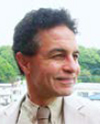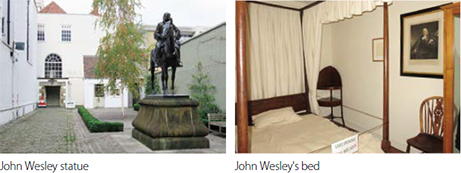
Gregory Strong
大学文学部英米文学科教授
John Wesley's Bristol
英国での在外研究を終えたグレゴリー・ストロング教授にイギリス西部の都市・ブリストルを中心としたジョン・ウェスレーの活動を紹介していただきました。
Bristol, England features as one of the most important places in John Wesley's evangelical (※1) mission. Here he preached his first outdoor sermon (※2) and founded the first Methodist chapel. In Bristol, his brother Charles, the brilliant musician and lyricist, lived with his family, and composed his most famous hymn. Finally, John Wesley established the first Methodist school.
Modern Bristol seems a sleepy place. Part of the town and much of the docks were destroyed by German bombing in W.W.II, or knocked down after the post-war economic slump. Tourism and waterfront condominium development have replaced the industries once here, but Wesley's "New Room" and Charles Wesley's house have survived.
In Wesley's time, Bristol ranked among England's greatest ports. The "triangle trade" saw its ships carrying trade goods to Africa which were sold in order to purchase slaves. The same ships carried the slaves, many dying of disease and bad treatment, to sell in the Caribbean and in America, to work on sugar, tobacco, and cotton plantations. The ships took this produce back to Bristol, making some merchants very rich.
There were no slaves in Britain itself, but it became the world's largest slave trading country. The wealth from the trade helped create some of Britain's greatest banks -- Barclays, Lloyds, and even the Bank of England.
Wesley's association with Bristol began this way. Ordained (※3) as an Anglican (※4) minister in 1725, he was elected to Lincoln College, Oxford, and he received his MA in 1727. Earlier in his studies, he had joined a society begun by his brother Charles, also a scholarship student at Oxford. Members dedicated (※5) themselves to religious study and practical Christianity. They gave part of their scholarship money to the poor, made prison visits, and aided (※6) people in finding spiritual comfort. Systematically, Wesley examined how he spent his time and money. Other students jeered (※7) at them as "Methodists." Wesley wrote that he was not ashamed to be methodical in religion, and later he and his followers took the name of Methodists.
Wesley left his university teaching position to preach salvation (※8) by faith and a powerful social message of charity. He proved too radical for the Church of England and Wesley was banned (※9) from preaching at many churches.
His friend, George Whitefield who had been a member of the same Oxford group, had also been banned, and he offered a solution. He had begun preaching outdoors to the coal miners (※10) of Kingswood, a town near Bristol. Recently, he had drawn a crowd of 10,000 people, many of whom had never been to a church service. But Whitefield had promised to go to America to speak and he begged (※11) Wesley to come and take over(※12) his work.
Outdoor preaching was controversial (※13) but Wesley was an ordained minister and he recalled (※14) Christ's sermons outdoors. In April 1739, he preached his first sermon to the miners and their families. After that experience, he realized that he could reach many people by preaching outdoors, so he crisscrossed (※15) England for the next 54 years, giving an estimated 250,000 sermons.
Wesley started organizing the early Methodists into "classes" of about 12 people who chose a leader and studied the bible together. Each contributed (※16) a penny, usually monthly, toward building The New Room in Bristol. It was enlarged in 1748 and is the oldest Methodist building in the world.
Although small, the New Room has a chapel with enough seats and benches for nearly a thousand worshippers (※17). With no windows on the ground floor to save money on the 18th century window tax, the room is lit by a big window in the ceiling. Strikingly, the chapel has a "double-decker (※18)" pulpit (※19), the first level for readings from the bible, the level above it for preaching. A rail protects the pulpit because sometimes people in the slave trade tried to attack Wesley and his preachers for condemning (※20) their trade.
In the "Common Room" above the chapel, Wesley and other travelling preachers met and ate together. The Methodists also held their annual conferences here, planning how to spread Christianity, and to send preachers to the colonies of America and Nova Scotia. Now visitors can view the harmonium on which his brother Charles composed his famous hymn, "Hark, the Herald Angels Sing." They can see one of John Wesley's black preaching gowns, the bed where he slept, his desk, even the window ledge where he wrote many of his books, standing up. His best-selling book, Practical Physic , collected the most effective medical advice of his time to aid the poor who could not afford to see a doctor. Altogether, Wesley wrote or edited about 300 books, earning as much as £ 30,000, but he gave it all away.
From 1749 to 1771, Charles Wesley, his wife, and seven children lived nearby in a narrow, five-storey brick (※21) townhouse. Drawing on his studies of English and classical literature, he often created hymns by finding new words to the popular songs of his day. Of his thousands of hymns, 500 are still sung today. Many celebrate significant events in the lives of those around him-- births, marriages, or even the death of a child. Heartbreakingly, he and his wife lost four of their children and they are buried nearby in St. James churchyard. But Charles Wesley enjoyed laughter, too, and even wrote light poetry about Grimalkin, his cat.
In 1748, John Wesley started Kingswood School for the miners' children, and later the children of his preachers. The first Methodist school, it led to a Methodist contribution to education world-wide, and to a mission to Japan in 1874 by Dora E. Schoonmaker, Robert Samuel MacLay, and Julis Soper. They started a preparatory school for girls and boys, the origins of Aoyama Gakuin's pre-school, elementary, high school, junior college, and university, part of the 800 Methodist schools and colleges in the world today.


※注釈
1. evangelical 福音的
2. preach a sermon 説教する
3. ordain 任命する
4. Anglican 英国国教会の
5. dedicate 専念する
6. aid 手助けする
7. jeer ~をあざける
8. salvation 救い
9. ban from doing ~することを禁止する
10. coal miner 炭鉱夫
11. beg to do ~してほしいと願う
12. take over 引き継ぐ
13. controversial 論争となる
14. recall 思い出す
15. crisscross ~を縦横にめぐる
16. contribute ~に寄付する
17. worshipper 礼拝者
18. double-decker 二階付の
19. pulpit 説教壇
20. condemn 非難する
21. five-storey brick れんが五階建て